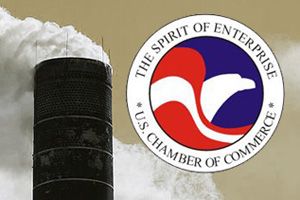Political disagreements with the US Chamber of Commerce have prompted the San Francisco Chamber to drop out of a program that automatically enrolled many of its members in the national group. “Given the controversy over the US Chamber’s position on climate change,” said San Francisco Chamber president Steve Falk, “I’ve decided to sever our participation in the partnership program.”
The US Chamber’s Federation Partnership program grants complimentary memberships to small businesses in 354 participating local chambers, often without their knowlege. It allows the US Chamber to claim a much larger number of members than it would have otherwise, but has become a potential liability for local chambers in cities where businesses may disagree with the national group’s right-wing political agenda.
“I do think some of our small companies might not like the fact that they’re automatically members or may not know that,” Falk said in announcing the decision to Mother Jones. He disclosed the move after a reporter called San Francisco Chamber members on Tuesday to ask if they were aware of the program and comfortable with their US Chamber memberships.
Until this week, the US Chamber of Commerce often claimed the members of local chambers as its own, regardless of their participation in the partnership program. It appeared to end that practice after it was exposed by Mother Jones this week; during a Wednesday press conference, the Chamber quietly revised its claimed membership from 3 million to 300,000 (though the larger number still appears on its website). The new membership figure is certain to grow even smaller if other local chambers follow San Francisco’s lead.
It was not immediately clear how many members the US Chamber will lose due to San Francisco’s withdrawl from the partnership, though the number could easily be more than 1,000. One of the ten largest chambers of commerce in the country, the San Francisco Chamber counts 2,000 members, 85 percent of whom it classifies as “small businesses.” Companies with annual revenues of less than $10 million were automatically enrolled in the US Chamber through the partnership, Falk said, but will now see their national memberships lapse if they do not choose to renew them.
In addition to booosting the US Chamber’s numbers, the Federation Partnership appears aimed supporting the Chamber’s claim to represent small businesses. The Chamber’s website says that “more than 96 percent of US Chamber members are small businesses with 100 employees or fewer.” However, the Chamber’s self-appointed board of directors is overwhelmingly dominated by large companies.
Begun in 2006, the partnership has never been as popular as the Chamber might have hoped. Of the local chambers representing the 100 largest US cities, only 17 currently participate. They include chambers in Chicago, Milwaukee, Albuquerque, Orlando,and Long Beach–cities where strong majorities of voters supported Barack Obama, a frequent target of the US Chamber’s attacks.
While the San Francisco Chamber is quitting the partnership, it will retain its membership in the US Chamber and continue paying the group $2500 in annual dues. Falk said the US Chamber provides his group important research data and legislative analysis. He added: “While we don’t agree on half [of major political issues]–I don’t know what the percentage is; maybe we disagree on more than half–to be a nominally affiliated member has more value than the little bit we pay for it.”
A spokesman for Recology, a recycling company that sits on the San Francisco Chamber’s board, stood by Falk’s decision: “On the question of should the San Francisco Chamber resign from the US Chamber, we respect and support Steve Falk’s view that to date there is value to the local chamber to maintain the relationship to gain insights about what’s going on in DC.”
But Melinda Cheel, executive director of the Green Chamber of Commerce, a Bay Area group of 165 businesses founded in 2007, argued that Falk should sever all ties with the national Chamber, including its membership in the group. “The actions of the US Chamber of Commerce recently are supportive of just big industries, dirty industries,” she said, “and I don’t think it’s good for San Francisco businesses in the long run.”












